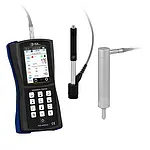
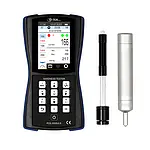
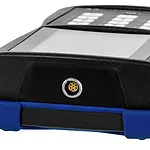
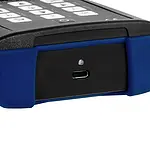
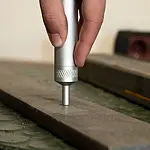
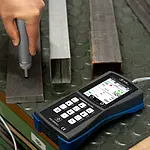
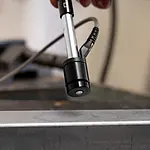
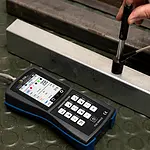
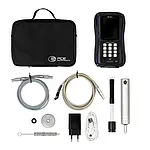
Bilingual Technical Support (EN / ES)
Public Service, Military and First Responder Discount
30 Day Return Policy
2 Year Warranty
Free Standard Shipping (US)
- Keypad allows quick data entry of hardness scales
- Intuitive menu
- High accuracy and speed of measurements
- Wide range of hardness values
- Internal memory for up to 500 user hardness calibrations and PC communication
- Small indenter imprint (suitable for mirrored shaft necks, blades, gear teeth, etc.)
- Hardness measurement of products with any mass, configuration, structure, degree of mechanical
and heat treatment
- Hardness measurement of surface hardened layers
- Hardness determination of products with a thickness of more than 1 mm (small parts, steel sheets,
thin-walled constructions, pipes, containers, products with complex shape, determination of the
hardness
of metal coatings, etc.) using special probes with reduced load energy.
- A wide functionality allows the user to choose the measuring scale according to Rockwell, Vickers,
Brinell or Shore, the conversion scale and the number of measurements.
- An intelligent averaging mode, unique statistical processing system and
flexible memory organisation allow the most convenient hardness measurement.
- All measurements are stored with date and time. The results can be displayed in the form of
displayed in the form of tables and diagrams, allowing a detailed analysis of the values obtained.
obtained.
- High quality probes, modern element base and processor.
- Built-in rechargeable battery allows continuous operation for approx. 9 hours and is charged via
USB cable recharged.
| Measuring range | Rockwell |
| 20 - 70 HRC | |
| Accuracy | 2 HRC |
| Measuring range | Brinell |
| 30 - 650 HB | |
| Accuracy | 10 HB in range - 90-180 HB |
| 15 HB in range - 180-250 HB | |
| 20 HB in range - 250-460 HB | |
| Measuring range | Vickers |
| 230 - 940 HV | |
| Accuracy | 15 HV -in range 240-500 HV |
| 20 HV - in range 500-800 HV | |
| 25 HV - in range 800-940 HV | |
| Standards | ASTM A1038, ASTM A956 |
| Indenter | UCI Sensor - Diamond indenter |
| Leeb Sensor - Hardened Ball | |
| Diameter of the surface for installation of the sensor for ultrasonic sensor | |
| - from 1 mm in plane | |
|
- from 5 mm in a blind hole (groove) for dynamic sensor from 10 mm in the plane | |
| Materials Ultrasonic sensor (UCI) | - pre-calibrated for steel |
| - Dynamic (Leeb) with pre-calibration for steel | |
| - alloy steel | |
| - cast iron | |
| - stainless steel | |
| - aluminium | |
| - bronze | |
| - brass | |
| - Copper | |
| Calculation Average value | from 1 to 20 measurements Minimum, maximum, average value |
| Results of incorrect measurements | Scale conversion Conversion of the measured hardness into different scales |
| Impact-resistant plastic housing | with rubber buffer |
| Working temperature | - 20 ... +45 °С |
| Display | LCD TFT 3.5'' ( 320x480 ) |
| Language | English, Ukrainian, Russian |
| PC connection | USB |
| Power supply | Battery |
| Operating hours | approx. 9h |
| Dimensions | 150 × 70 × 45 mm |
| Weight | 300 g |